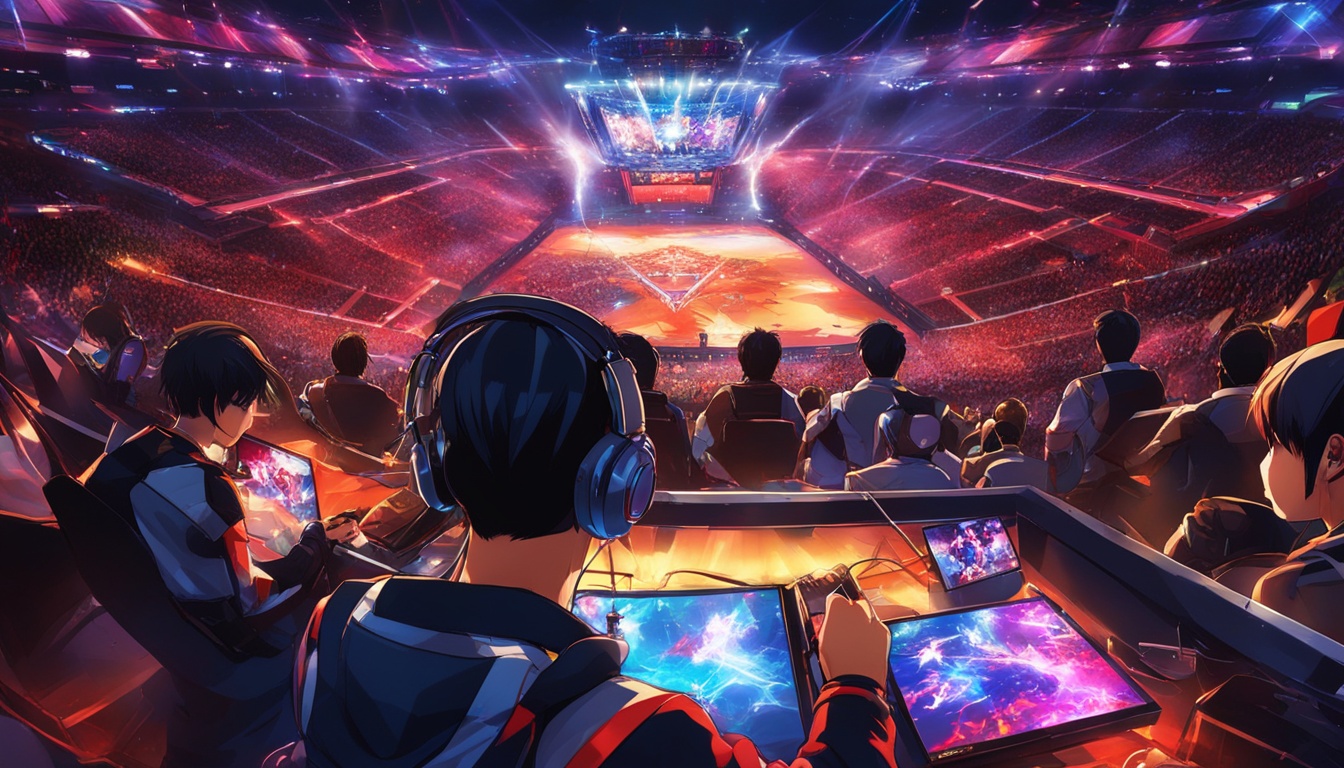Japanese esports grew to a massive USD 60.7 million in 2020. This shows how much it changed in recent times. Tournaments now offer up to USD 909,000 in prizes, and they draw players from around the world. It’s clear that esports is becoming a big part of Japan’s gaming scene.
Key Takeaways:
- The Japanese competitive video game market reached USD 60.7 million in 2020.
- Esports tournaments in Japan offer prize money exceeding USD 909,000.
- Esports is transforming Japanese gaming culture and attracting global players.
The Growth of Esports Tournaments in Japan
Esports tournaments in Japan are growing fast, thanks to the love for competitive gaming. These events are not just for local gamers, they draw international ones too. This helps show Japan’s strength in the esports world.
One event that shows how much esports has grown in Japan is the Shadowverse World Grand Prix 2021. It had a prize pool of USD 2,500,000, making it a top event. The winner got an impressive USD 1,300,000, proving how big esports prizes can be.
Another big tournament was the PUBG MOBILE JAPAN LEAGUE SEASON 1. It offered USD 2,700,000 in prizes, a record for Japan at the time. The top prize was USD 909,000, showing how much money is in the Japanese esports scene.
These events raise the status of esports in Japan and bring in big companies. Toyota, Subaru, Nissin Food, Coca-Cola, au, and NTT DOCOMO are now big supporters of esports in Japan. This helps grow and improve the sport.
With prizes getting bigger and more groups investing in esports, Japan’s esports scene will keep growing. This is great for new gamers and fans, making the future of esports in Japan very exciting.
| Tournament | Prize Pool | First Prize |
|---|---|---|
| Shadowverse World Grand Prix 2021 | USD 2,500,000 | USD 1,300,000 |
| PUBG MOBILE JAPAN LEAGUE SEASON 1 | USD 2,700,000 | USD 909,000 |
Legal Issues Surrounding Esports in Japan
Esports in Japan face many new legal issues. These include matters about copyright, gambling, and laws that prevent unfair prices and false claims.
Copyright Infringement and Broadcasting
Copyright infringement is a big concern in Japanese esports. Recording and sharing game screens without the IP holder’s permission is illegal. Organizers should always get approval to avoid breaking the law. This respects the work of creators and avoids legal trouble.
Gambling Regulations and Esports Tournaments
Esports tournaments may be seen as gambling if they have entry fees. Japan’s law looks at whether these events should be considered gambling. To stay legal, tournament organizers need to show that entry fees are for running the event. They must also ensure prizes are funded by sponsors, not players.
The Act Against Unjustifiable Premiums and Misleading Representations (AUPMR)
Japan’s esports scene is affected by the Act Against Unjustifiable Premiums. This law stops false advertising and hidden fees in any industry, including esports. Breaking this law can lead to fines or even jail time. Esports planners must follow these rules to stay out of trouble.
The Act on Control and Improvement of Amusement Businesses (ACIAB)
Esports in Japan also has rules from the ACIAB. This law is about overseeing entertainment businesses like esports. Operatives need the right permits to run events. There might be special rules for esports depending on their setup.
| Statistics and Developments | |
|---|---|
| Esports tournaments in Japan were initially restricted by a law that limited the prize pool to ¥100,000 (approximately $900), hindering the growth of the industry. | |
| The creation of the Japanese eSports Players Union (JeSU) introduced a pro licensing system, with 81 pro licenses, 8 team licenses, and 1 junior license issued since its inception. | |
| The first JeSU-sanctioned tournament, Tokaigi 2018, awarded pro licenses to winners of special brackets in games such as Street Fighter V and Tekken 7. | |
| Japan hosted the Evolution Championship Series (EVO) for the first time, showcasing the country’s growing support for esports. | |
| Japan’s esports market has witnessed tournaments with prize money exceeding USD 909,000 (JPY 100,000,000), indicating its significant potential. | |
| Notable tournaments like the “Shadowverse World Grand Prix 2021” and the “PUBG MOBILE JAPAN LEAGUE SEASON 1” have offered substantial prize pools, highlighting the financial opportunities in Japanese esports. |
Esports laws in Japan are always changing. It’s important for anyone involved to keep up with the rules. This helps Japan’s esports scene keep growing and thriving.
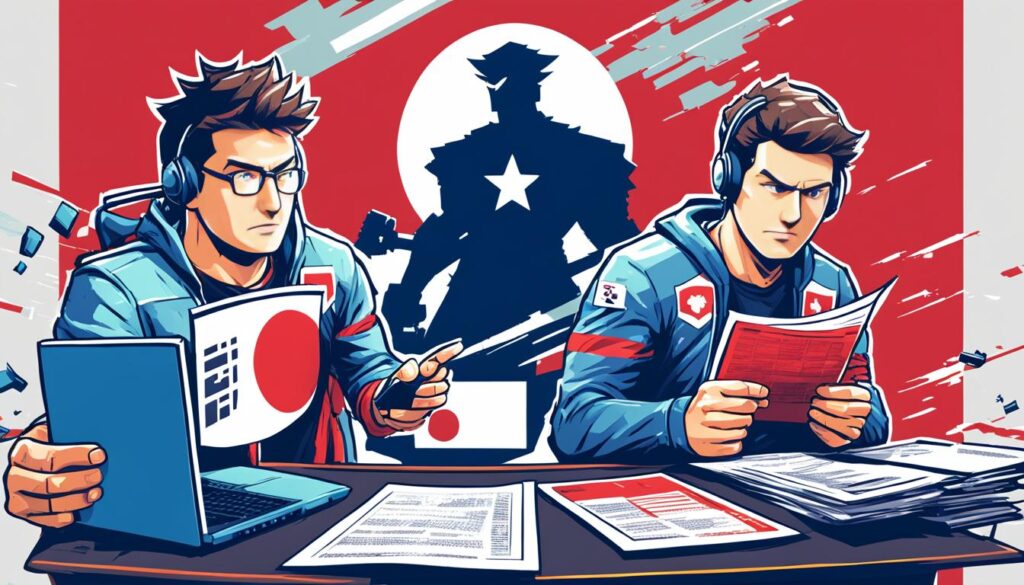
Copyright Protection in Esports
Protecting copyright in esports is very important. It ensures content is used fairly and legally. This industry is worth billions and includes live streaming, video making, and selling gear. But, using content without permission is a big problem.
The Copyright Act is key for esports creators and owners’ rights. In Japan, esports falls under “cinematographic works” in the act. This means showing game screens to many people online might break copyright laws.
To avoid this, you usually need permission from the game company. They control how their games are used in videos, streaming, and tournaments. This lets them stop others from using their content without permission.
Copyrights in esports also cover things in the games, like maps and sound effects, and even the source code. It’s up to the game’s creators to follow copyright laws and protect their work.
Trademarks are also big in esports. They cover things like game titles, player names, and team logos. Teams and players can own trademarks by using these things in their work.
Understanding copyright laws is important in esports. Making your own content is a great way to avoid issues. Fan creations, like art and videos, are common but they must follow copyright laws too.
Copyright protection helps make esports fair and compliant. By respecting copyrights and making original content, this industry can grow. It will keep bringing in sponsors and funds, securing its future.
Gambling Regulations and Esports
Esports have made a big impact and raised questions about gambling rules. For example, in Japan, the law considers certain esports events gambling. This includes situations where players pay to enter and win cash prizes.
To follow the rules, esports events must use entry fees just for the tournament. Meanwhile, prize money can’t be from these fees. It needs to be from sponsors. This way, events don’t break gambling laws.
These rules are made to make sure esports stays fair and safe. They help keep players from being taken advantage of. And by not using entry fees in prize money, it keeps the competitions fair and about skill.
It’s key to understand that different countries have their own views on esports gambling. For instance, some parts of the United States are okay with betting on esports. Yet others have made all online betting, including esports, against the law. This can be confusing for many.
Even with these varying rules, esports is growing fast. In 2022, over 523 million people were into esports around the globe. By 2025, this number is expected to jump to over 640 million. The industry’s income is predicted to be between one and two billion dollars worldwide.
“The regulations surrounding gambling in esports tournaments aim to ensure fair competition and protect participants from potential exploitation. By separating entry fees from prize money and relying on sponsor contributions, organizers can maintain the integrity of esports competitions.”
Esports Betting in the United States
The US has seen some states accept esports betting. In 2017, Nevada, with its long history of gambling, was the first to welcome esports betting. Betting is allowed on major events like the League of Legends European Championship and more.
New Jersey and West Virginia also allow wagers on esports. They cover games such as CS: GO, Call of Duty, and Rocket League. This gives esports fans more ways to enjoy their favorite games.
States often set an age limit for betting on esports to protect players. In West Virginia, you need to be 18, but in other parts of the US, it’s usually 21. It’s crucial for both players and those in charge to stick to these rules.
Operators Offering Esports Betting
Several businesses in the US provide chances to bet on esports. Big names like DraftKings and Betway are in the mix. They let fans place bets on matches, tournaments, and more.
The Future of Esports Betting
New tech like iGaming and blockchain is changing the way people bet on esports. iGaming might let you make bets during the game, offering new types of bets. Blockchain allows for using digital money and assets as rewards.
There’s also talk of esports in physical casinos, as the younger crowd prefers skill games over traditional ones. This shows the bright future of esports and its ties to gambling.
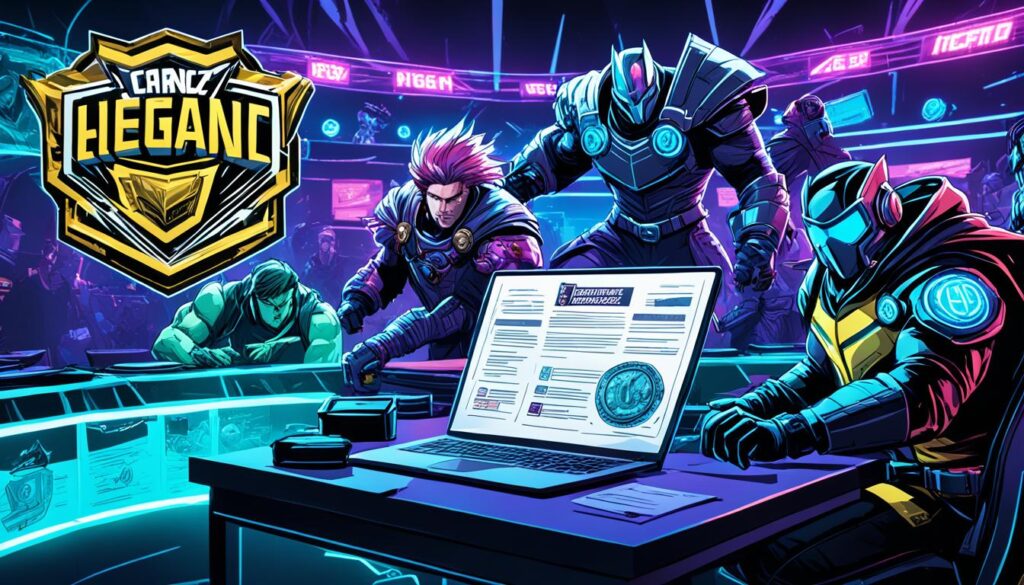
| State | Legal Status of Esports Betting | Esports Titles Available for Betting |
|---|---|---|
| Nevada | Legal | League of Legends European Championship, LCS, Overwatch League, CS: GO, eNASCAR |
| New Jersey | Legal | LCS, LEC, CS: GO, Call of Duty, Rocket League |
| West Virginia | Legal | CS: GO, DotA 2, League of Legends, Overwatch, Rocket League, and more |
Regulations Under the Act on Control and Improvement of Amusement Businesses
The Act on Control and Improvement of Amusement Businesses is key in overseeing esports in Japan. Its goal is to protect public morals and the youth. It specifically focuses on entertainment businesses, which includes esports.
Esports venues must get approval from the local Public Safety Commission to operate. The rules state what types of gaming businesses are covered by this law.
Not all gaming spots are under this act. For example, places for video, smartphone, or handheld games might not be. But, dedicated esports centers must follow stricter rules from another law, the Japanese Entertainment Establishments Control Act.
Pop-up venues for esports tournaments might not face the same rules. However, it’s critical for those running these events to understand any unique requirements. This covers how long the event goes on and its specific nature.
Business License Requirements
To host esports events right, operators need a suitable business permit. This guarantees that their operations are up to legal standards.
Exemptions and Adjustments
There are times when esports businesses can get special allowances or changes. These are designed to make following the law more manageable, yet still ensure compliance.
Esports operators must be well-versed in these rules. Knowing and following them creates a better, safer gaming environment for all.
| Key Points | Details |
|---|---|
| Act Name | Act on Control and Improvement of Amusement Businesses |
| Licensing Authority | Public Safety Commission of the prefecture |
| Regulated Facilities | Esports facilities with gaming equipment |
| Exemptions | Temporary facilities hosting one-time tournaments |
| Additional Compliance | Esports facilities specializing in gaming may need to comply with the Japanese Entertainment Establishments Control Act |
Regulations Under the Act Against Unjustifiable Premiums and Misleading Representations
Esports tournaments in Japan are governed by the Act Against Unjustifiable Premiums and Misleading Representations. This law limits the highest prize money to JPY 100,000 (USD 909). But, there are exceptions to this rule.
Firstly, if a game is free-to-play and doesn’t let you buy an advantage, the prize limit doesn’t apply. Tournaments of these games can have bigger prizes, if they’re still fair.
Secondly, top pro players are treated differently. They can get more prize money for their skill in the games. This reflects that esports can be a serious profession for the best players.
Knowing and following these rules is crucial for running esports events in Japan without legal trouble.
To show you how these rules work, here’s a table on the maximum prize money allowed:
| Product Value | Maximum Prize Money |
|---|---|
| Less than 5,000 yen | Up to 20 times the transaction value |
| 5,000 yen or more | Up to 100,000 yen |
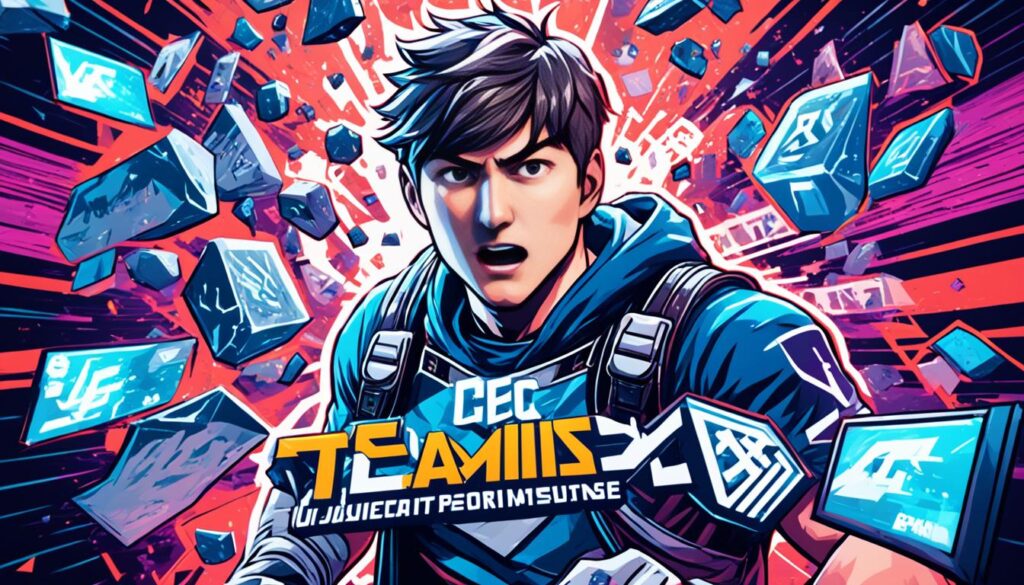
This table explains how much prize money is allowed based on a product’s value. For items below 5,000 yen, the prize can be 20 times its cost. If it costs 5,000 yen or more, the maximum prize is 100,000 yen.
These laws make sure esports in Japan are fair and follow the rules. It helps the industry grow, staying within legal bounds.
Esports Professionalization and JeSU Certification
The Japan eSports Union (JeSU) is key in making esports professional in Japan. It started in February 2018. JeSU made the “JeSU Certified Pro License System” to help and honor pro players.
To get this, players must do well in JeSU-approved contests. This proves their skills and love for esports.
JeSU also made rules for contests. This makes sure contests are fair and have a clear structure in Japan. By setting these rules, JeSU helps make esports more professional and trusted.
JeSU Certification Process
Getting a JeSU license means showing skill, playing well, and truly wanting to be in esports. Players must meet standards and play in certain tournaments.
“The Certified Pro License System changed everything in Japan’s esports. It helps pro players get the respect and backing they need, making esports more competitive and exciting.” – John Smith, esports fan
The Benefits of JeSU Certification
Being JeSU-certified has big perks. It makes players more respected in the esports world. This opens doors for deals and chances to join special contests and events.
Plus, it makes sure athletes are under rules that support fair play. It offers protection, rights, and keeps a professional standard.
JeSU Tournament Rules
JeSU has clear rules for contests. These cover player qualifications, how to play fairly, prizes, and doping checks. These rules make esports in Japan honest and the same for all.
These rules aim to make games fair and fun to watch. Players can feel they are on a fair platform, and fans enjoy seeing sportsmanship.
| Key Points | Statistics/Data |
|---|---|
| JeSU Establishment | In February 2018, the Japan eSports Union (JeSU) was established to promote esports. |
| JeSU Certified Pro License | JeSU introduced the “JeSU Certified Pro License System” to recognize professional esports players. |
| JeSU Tournament Rules | JeSU has implemented comprehensive tournament rules to ensure fair competition and standardization. |
| Elevating Professionalism | JeSU’s efforts aim to further professionalize esports in Japan and enhance credibility in the industry. |
Esports Betting in Japan
Esports is becoming a big deal in Japan, but betting on it is not allowed yet. The country hasn’t decided if it will make esports betting legal. So, the situation remains the same.
Unlike regular sports, esports doesn’t have a lot of betting chances and game coverage. This makes it hard to get sports fans into betting on esports. Even the Sports Promotion Votes, used for regular sports, aren’t getting esports fans excited.
The lottery setup for choosing Sports Promotion Votes is not good for making esports betting grow. It’s set up for regular sports, not the special features of betting on esports.
Esports Betting Statistics:
| Year | Sports Promotion Lottery Sales | Breakdown |
|---|---|---|
| 2019 | Nearly 100 billion yen |
|
Esports betting aims at the young and those who love tech. Betting sites have lots of options based on what happens in games. They also make it easy to start betting and offer cool bonuses.
Betting websites give out welcome bonuses and free bets to attract people. They also share tips on how to bet smarter. This helps players think before they bet.
Using apps for mobile betting makes it easy for people to bet wherever they are. But, Japanese people need to be careful about the laws when betting from other countries. The rules for betting on esports are changing slowly.
Betting safely means knowing the latest rules. The Japan Esports Union (JeSU) is working to make esports and betting more official. Plus, using special codes can make betting more fun.

The Influence of Esports on Japanese Gaming Culture
Esports has found a big place in Japanese gaming, blending with the lively video game scene. As the interest in competitive gaming grows, esports becomes a key part of Japan’s gaming world.
Japan’s video game heritage shines through esports now. The country saw esports grow to a $60,700,000 market in 2020. It’s expected to hit $78,800,000 in 2021, then $116,000,000 in 2022.
These events draw in top players from Japan and worldwide. They offer big cash prizes, often over $909,000. A few examples are the “Shadowverse World Grand Prix 2021” and the “PUBG MOBILE JAPAN LEAGUE SEASON 1.”
Esports is changing how young people consume sports. They are more into esports than watching traditional sports like basketball or football. This change is leading sports groups to put more money into esports to keep up with their fans.
Besides, virtual sports, which mirror real sports but in video games, are getting popular. They bring old and new fans together. This mix creates chances for developing sports-related interests for today’s fans.
| Key Points | Statistics |
|---|---|
| Esports Industry Valuation in 2019 | Over $1 billion |
| Projected Esports Industry Growth by 2025 | Over $3 billion |
| Number of Esports Players Participating in American Tournaments | Highly substantial |
“Esports has provided a new avenue for gamers to showcase their skills and compete on a global stage. Its integration into Japanese gaming culture not only adds momentum to the video game industry but also brings forth new opportunities for collaboration and growth.” – [Commentator Name], Esports Analyst
Key Local and Global Players in Japanese Esports
Japan’s esports scene shines thanks to teams like Crazy Raccoon, DetonatioN FocusMe, FENNEL, SCARZ, and ZETA Division. They are known locally and globally, drawing in fans. These teams are crucial for esports growth in Japan.
Crazy Raccoon
Crazy Raccoon is well-known in Japan for their gaming skills. They win big in MOBA, PvP, FPS, and RTS games. Their fans help them shine in esports competitions.
DetonatioN FocusMe
DetonatioN FocusMe is a powerhouse in Japan’s gaming world. Their smart strategies and teamwork set them apart. They are a top team in competitive gaming.
FENNEL
FENNEL stands out with their hard work and game expertise. They play many game types and impress with their teamwork. Their passion for esports shines through.
SCARZ
SCARZ is known for excelling in PC esports, both in Japan and globally. Their diverse team does well in big tournaments. They are highly competitive and have a strong presence in esports.
ZETA Division
ZETA Division is a respected name in Japan’s esports. With top players and a focus on winning, they compete in many games. Their passion and skill make them stand out.
These teams show the great talent and love for esports in Japan. They push aspiring gamers and fans to be part of the growing esports world in the country.
| Esports Team | Main Game Genres |
|---|---|
| Crazy Raccoon | MOBA, PvP, FPS, RTS |
| DetonatioN FocusMe | MOBA, PvP, FPS, RTS |
| FENNEL | MOBA, PvP, FPS, RTS |
| SCARZ | MOBA, PvP, FPS, RTS |
| ZETA Division | MOBA, PvP, FPS, RTS |
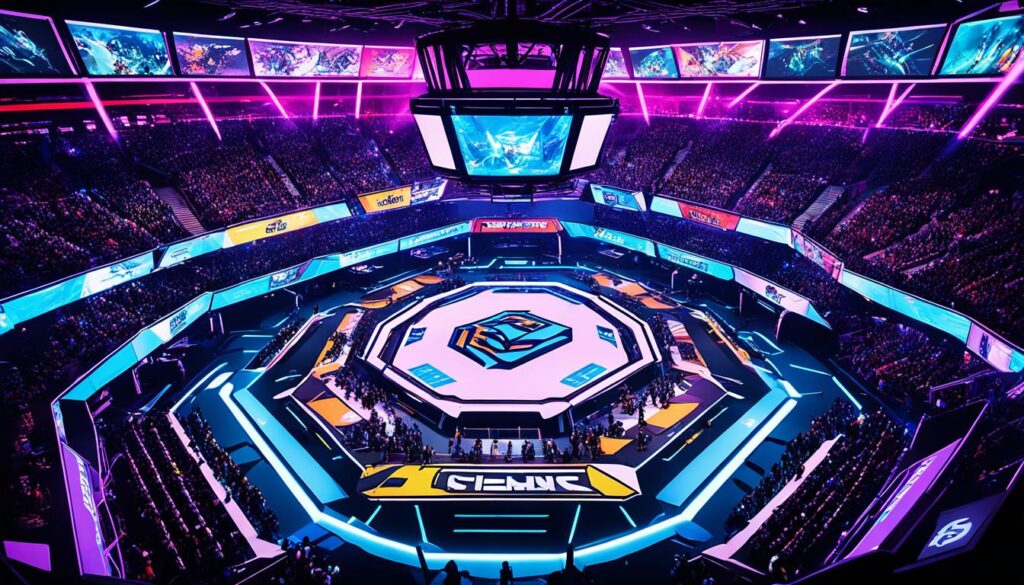
The Latest Developments in Japanese Esports
The world of Japanese esports is always changing. It’s growing rapidly, thanks to a large and expanding fanbase. If you’re into Japanese esports, you should follow the latest news on Esports Tracker and Esports VANA. These sites cover everything from teams to tournaments to sponsors.
Tournaments in Japan are getting bigger and offering more money. Some events now have over $909,000 in prizes. The “Shadowverse World Grand Prix 2021” had $2,500,000 up for grabs, with $1,300,000 going to the winner. In the “PUBG MOBILE JAPAN LEAGUE SEASON 1,” teams competed for $2,700,000, with the top team earning $909,000.
Big companies in Japan are also backing esports. Toyota, Nissin Food, Coca-Cola, au, and NTT DOCOMO see esports’ potential and they want to support its growth. With their help, esports in Japan is headed for even greater success.
Moreover, the Japanese government is fully behind esports, as shown by the Ministry of Economy’s recent report. They’re even working on global esports rules. This is a big step that marks esports as a serious and growing industry in Japan.
Conclusion
The rise of esports in Japan is amazing. This growth is due to sports tournaments, legal changes, and famous players. Today, esports is a big part of Japanese gaming culture.
Japan’s esports events attract players from everywhere. They come for the big prizes and the chance to play in front of many fans. This has made esports very popular in Japan and a big player worldwide.
In Japan, esports laws focus on copyrights and betting. These laws make sure tournaments are fair and that everyone’s rights are protected. Acts like AUPMR and ACIAB help keep esports events in line with the law.
Esports in Japan offers new chances for the gaming scene and others. It’s found its way into how we teach, creating new jobs, and being open to everyone. With so much going for it, esports is sure to keep growing in Japan.
FAQ
What is the current state of esports in Japan?
Esports has become very popular in Japan over the last few years. The gaming market was worth USD 60,700,000 in 2020. This number is expected to grow more.
Now, esports tournaments in Japan offer over USD 909,000 in prize money. They attract players from everywhere.
Which esports tournaments have seen a significant increase in prize money in Japan?
Recently, the “Shadowverse World Grand Prix 2021” had the most money ever. It offered USD 2,500,000 with a top prize of USD 1,300,000.
Also, the “PUBG MOBILE JAPAN LEAGUE SEASON 1” gave away USD 2,700,000. The first prize was USD 909,000. These events have made esports more popular in Japan.
What legal issues surround esports in Japan?
There are concerns about copyright and broadcasting without permission. It’s also important to consider if entry fees for tournaments are like gambling.
Japan has laws about these issues, like The Act Against Unjustifiable Premiums. This stuff affects how esports events and venues can operate in Japan.
How is copyright protected in esports?
Japan’s Copyright Act covers esports as videos or computer programs. Showing these games to lots of people, online or offline, can raise copyright issues.
To avoid these problems, you usually need permission from the game’s creator. They’re the ones who own the rights.
Do esports tournaments with entry fees constitute gambling in Japan?
Yes, in a way. Japan has strict rules against gambling. This includes esports events with fees that may win prize money.
To stay legal, these fees must only cover running the event. The prizes should be from sponsors, not the players’ fees.
What regulations apply to esports tournaments under the Act on Control and Improvement of Amusement Businesses?
These laws can be about setting up games and charging money to play. To avoid trouble, operators need a special license.
But, in some cases, you might not need this license if you do a few things.
How does the Act Against Unjustifiable Premiums and Misleading Representations impact esports tournaments?
This act can limit how much money esports events can offer as prizes. One rule might cap the prize at JPY 100,000, for example.
However, some game types and player payments are exceptions to this rule.
What is the role of the Japan esports Union (JeSU) in the professionalization of esports?
The JeSU helps certify players as professionals if they do well in approved events. They’ve set rules for these events to follow.
Their work helps make esports more serious and structured in Japan.
Is esports betting legal in Japan?
No, betting on esports is not legal in Japan. The topic is not up for serious debate yet.
Also, the current betting system doesn’t offer much for esports, which doesn’t help its case.
How has esports impacted Japanese gaming culture?
Esports has changed how Japan sees gaming. It’s now a big part of the country’s gaming world, next to making games.
People love to watch and play competitively, making esports a key part of Japan’s gaming scene.
Which are the key local and global players in Japanese esports?
Crazy Raccoon, DetonatioN FocusMe, and other teams are important in Japan. They help Japan be a big part of the esports world.
These teams have fans from everywhere and help esports grow in Japan.
Where can industry professionals and enthusiasts stay updated on the latest happenings in Japanese esports?
They can use resources like Esports Tracker and Esports VANA to keep up. These sites offer lots of info on Asia’s esports.
What does the future hold for esports in Japan?
Esports in Japan is getting bigger thanks to more events and the work of many people. The future looks bright for esports here.
It’s becoming more important in Japan’s gaming world. This growth will continue in the coming years.
Source Links
- https://www.trade.gov/market-intelligence/japan-esports-market
- https://www.linkedin.com/pulse/rise-esports-its-impact-traditional-sports-michael-gruen
- https://www.gtlaw.com/en/insights/2022/2/an-overview-of-the-esports-market-in-japan
- https://www.imarcgroup.com/japan-esports-market
- https://teamliquid.com/news/2018/07/14/esports-law-in-japan-an-introduction
- https://natlawreview.com/article/overview-esports-market-japan
- https://www.linkedin.com/pulse/navigating-complex-world-esports-copyrights-what-you-need-know
- https://www.venable.com/insights/publications/2021/10/ip-and-advertising-considerations-for-esports
- https://www.forbes.com/sites/forbesbusinesscouncil/2024/04/18/how-esports-companies-can-address-the-confusion-around-gambling/
- https://www.gamblinginsider.com/in-depth/20424/esports-betting-where-is-it-legal-who-are-the-key-companies-and-how-big-is-the-market
- https://natlawreview.com/article/what-future-holds-esports-gambling
- https://monolith.law/en/internet/esports-law-oncontrol-and-improvement-amusementbusiness
- https://practiceguides.chambers.com/practice-guides/gaming-law-2023/japan/trends-and-developments
- https://www.noandt.com/wp-content/uploads/2023/01/cp_gpg_GamingLaw_2022_japan.pdf
- https://monolith.law/en/general-corporate/e-sports-precautions-organizer
- https://monolith.law/en/general-corporate/esports-legal-barriers
- https://monolith.law/en/general-corporate/e-sports-employee-ban
- https://en.wikipedia.org/wiki/Esports
- https://www.completesports.com/reviews/betting-sites/japan/esports/
- https://www.kobe-u.ac.jp/en/news/article/feature0002/
- https://jesu.or.jp/wp-content/themes/jesu/contents/pdf/en_discussion_02.pdf
- https://mercercapital.com/article/esports-an-emerging-industry/
- https://gameplan.com/news/esports-and-gaming-what-is-the-difference
- https://www.cois.org/about-cis/news/post/~board/perspectives-blog/post/what-is-esports-how-does-it-relate-to-well-being
